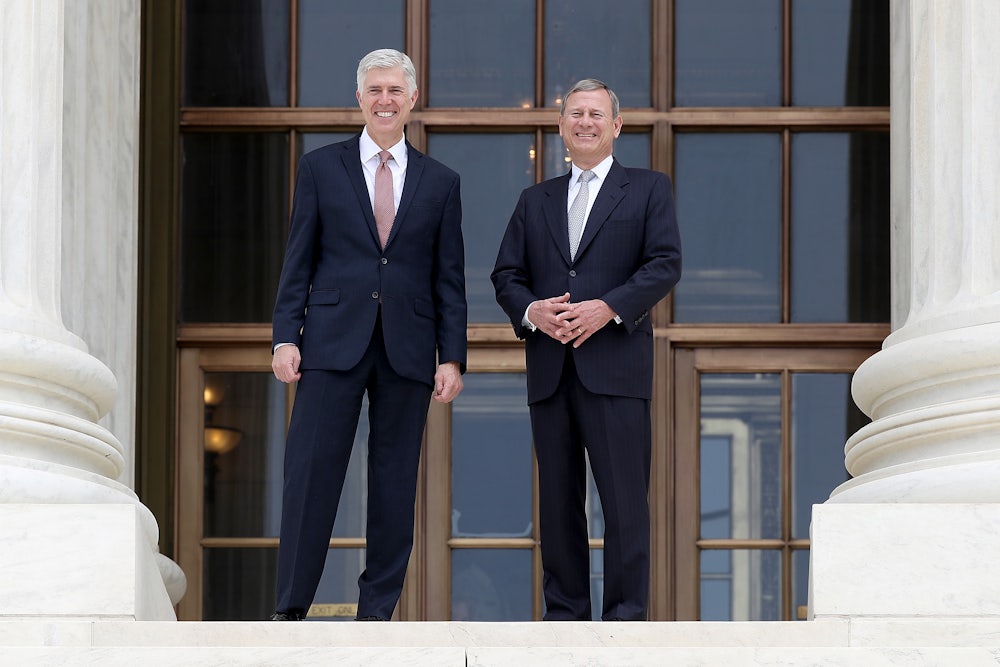When it comes to accommodating religious individuals or groups, the government has always been given a significant amount of discretion. For example, churches don’t pay many taxes, and they’re exempt from certain anti-discrimination laws when it comes to things like hiring clergy members. But the benefits that accrue from the First Amendment’s protections of religious freedom have historically included limitations on the government’s ability—and obligations—to fund church activity. Thanks to the Supreme Court, that symmetry is disappearing.
The Court on Monday struck down a major barrier between church and state, ruling for the first time ever that the government must give direct cash aid to a church. In a 7-2 ruling, the justices found that Missouri violated the Free Exercise Clause when it excluded Trinity Lutheran Church from a reimbursement grant program to resurface its playground with recycled tire scraps. The exclusion was based on a provision in Missouri’s constitution prohibiting the use of public funds for church aid.
According to Chief Justice John Roberts, Missouri discriminated against Trinity Lutheran “simply because of what it [i]s—a church.” “There is no dispute that Trinity Lutheran is put to the choice between being a church and receiving a government benefit,” he wrote in the court’s majority opinion in the case, Trinity Lutheran Church of Columbia v. Comer.
If a state denies public funding to a religious group, the chief justice said, it has to have a compelling reason for doing so beyond mere “policy preference.” It seems that the guiding principles of the Establishment Clause, which established the church-state divide, were not enough.
Justice Sonia Sotomayor addressed this glaring omission in her searing dissent. “The Constitution creates specific rules that control how the government may interact with religious entities,” she wrote, joined by Justice Ruth Bader Ginsburg. “And so of course a government may act based on a religious entity’s ‘status’ as such.” Rather than “disfavor” religion, a state’s decision not to fund a church is a “valid choice to remain secular,” according to Sotomayor.
The chief justice remained silent on Sotomayor’s point: that the government treats religious entities differently all the time. But with Monday’s decision, the Supreme Court chipped away at the discretion states have to exclude religious entities from certain government programs.
“You’re now saying that the First Amendment not only permits but requires the government to use taxpayer funds for a church,” said Greg Lipper, a former senior litigation counsel for Americans United for Separation of Church and State. He called the decision a “minefield in playground’s clothing.”
The decision is best understood in the context of three parallel trends: the outsourcing of public services to private institutions; the increasing participation of religious groups in providing those services; and the growth of the religious exemption regime through wide-ranging laws like the Religious Freedom Restoration Act. As a result, public services are being replaced by “private programs that can place all sorts of religious- and cultural-based tests on who gets those services,” according to Lipper. Many religious groups are insisting that they be treated neutrally when it comes to benefits but receive special treatment when it comes to regulations.
A press release published Monday by the Alliance Defending Freedom, which argued the case on behalf of Trinity Lutheran, highlights this contradiction.
“We didn’t ask for special treatment,” said ADF President Michael Farris. “We asked for equal treatment for people of faith. And the court agreed that the government cannot discriminate against people of faith by treating them unequally.”
Also on Monday, the Supreme Court agreed to hear Masterpiece Cakeshop v. Colorado Civil Rights Commission, in which a Colorado baker is seeking exemption from a generally applicable anti-discrimination law because of his religious views. Lawyers from the ADF are representing the baker, who is basically asking for special treatment.
Viewed in this light, the court’s ruling in Trinity Lutheran is “an asymmetry that can only be explained by a preference for religion,” according to Nelson Tebbe, who teaches constitutional law at Brooklyn Law School. Caroline Mala Corbin, a law professor at the University of Miami, agreed. “The bottom line is an incredible privileging of religion,” she said.
But Missouri had an Establishment Clause concern that went beyond protecting secular values. It’s worth noting that religious groups weren’t unanimously on Trinity Lutheran’s side in this case. Several, including the Baptist Joint Committee for Religious Liberty, the General Synod of the United Church of Christ, and the Union for Reform Judaism, submitted briefs to the Supreme Court in favor of Missouri, arguing disestablishment is necessary to protect individual religious liberties and the rights of religious dissenters.
After all, the Establishment Clause was written in large part to protect religion from government intervention, as well as to prevent some religious groups from being favored over others.
When I spoke with Michael McConnell, a former judge on the Tenth Circuit Court of Appeals who now teaches at Stanford Law School, he said the Trinity Lutheran ruling was “spot-on, exactly right.” He echoed the chief justice’s conclusion that the rubberized playground grant is an entirely secular public benefit akin to police and fire protection.
And yet fire protection is granted to everyone equally. The scrap tire program required applications, and grants were only awarded to 14 out of 44 applicants. The grants were more likely to be received by majoritarian religious groups with enough funding, membership, and connections to make it to the top of the application pile.
Justice Sotomayor raised this concern in her dissent, writing that the program favors “those with a belief system that allows them to compete for public dollars and those well-organized and well-funded enough to do so successfully.”
Beyond hampering the state’s interest in maintaining secular policies, Monday’s decision is a “terrible blow” to the Establishment Clause values that protect religion, according to Corbin, who astutely warned, “We are not at a point in time in our history where we should be ignoring the ramifications of a decision on minority religions.”
